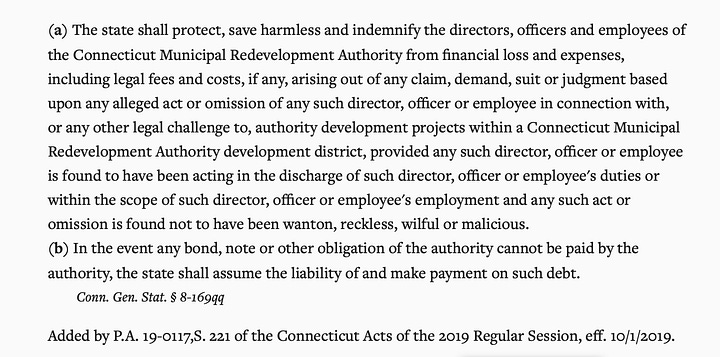The Municipal Redevelopment Authority aka MRDA, is a quasi government agency that was dubiously enacted via the State of Connecticut’s biannual budget in 2019. Governor Malloy had been trying to pass legislation to create the MRDA since 2015. Each time it was introduced it was killed. With good reason. In 2017 legislators tried to create the municipal redevelopment agency with the powers to seize private property! In 2019, Lamont snuck the municipal redevelopment agency into in the budget and has been growing its power ever since. To kick start the Municipal Redevelopment Authority, the budget provided a General Fund appropriation of $500 thousand for both the fiscal years of 2020 and 2021. The MRDA was created by the executive branch without a hearing, bypassing the legislative process where the people have a voice. Did you vote for this? Did you know about this?
The MRDA does not have a website, no annual report I could find. No links on the State of Connecticut website to see who is on the board. Heck, one would not even know it exists! It’s not listed on the state’s quasi government page with the other quasi agencies. I stumbled upon this by accident writing about Connecticut Innovations, the state’s quasi venture capital firm. Another interesting point to make about the MRDA, Lamont requested more funds to help the agency grow. What about the money already allocated via the General Fund?
Citizens did not want this new agency, but here we are. The Municipal Redevelopment Authority will usurp zoning power away from local municipalities to a centralized government where developers enjoy the upper hand above citizens. Towns are incentivized via funds distributed by the Department of Economic and Community Development. The foundation has been laid for re zoning the State of Connecticut into a developer’s paradise. Regular folks paying attention to the zoning battle unfolding in Hartford have been working hard to stop the state from taking over zoning. It is an up hill battle! The majority party leadership under Governor Lamont is hellbent on supporting centralized zoning, they say it’s to make “affordable housing”, but the government has failed over and over again with this. It’s not surprising that during the last legislative session SB 998, “AN ACT ESTABLISHING A TAX ABATEMENT FOR CERTAIN CONSERVATION EASEMENTS AND ADDRESSING HOUSING AFFORDABILITY FOR RESIDENTS IN THE STATE” , passed into law. This bill lays the ground work for Fair Share. I wrote about the Fair Share last spring. You can read that here SB 998 had strong bipartisan opposition, yet it passed. Why? Quasi government agencies are antithetical to a free society based on representative government. Where government cannot achieve what it wants, it uses its secret weapon, the public, private, partnership!




The MRDA is a corporate entity that has the power to issue bonds, buy and sell property, manage property and collect rent. They can also provide tax incentives for private developers. It can adopt and alter a corporate seal, manage development districts also known as “housing growth zones” HGZ. Towns of 70,000 thousand +, and multiple towns with a minimum of 70,000 combined can sign on and be part of the MRDA where they will have access to MRDA funds and developers. Towns and cities will give up their managing and zoning power to the quasi agency, the authority! What this will look like is not yet known, but one can speculate that big developers will swoop in with sweetheart deals. The MRDA has access to public funds, the power to shape law, and operate as a private business. All quasi government agencies enjoy broad and sweeping powers. After all, they are quasi for a reason! Unelected business interests can steer government where it needs to go for their maximum profit.
All quasi government agencies have a board of directors. The majority party controls the voting power of the board with the advantage of being able to pick more board seats than the minority party. A super majority like we have now has an even bigger advantage, because the governor gets to pick board seats too. One of the major perks of being a quasi agency is you get privacy protection that government does not. A quasi agency can also bypass rules and regulations the government cannot. You know, those pesky hearings where the public comes to voice their concerns about the laws coming out of Hartford. It’s so much easier to operate in a quasi government agency and not deal with the public’s intrusion.
Connecticut is rife with public, private, partnerships. I could spend my entire life writing about it! Peeling the layer of one area of corruption always leads to another pubic, private, partnership, and a new layer of corruption. The most shocking of them all are the quasi government partnerships. There are 17 of them in Connecticut. Most folks don’t know they exist. It is time for this to change!
Links and References:
MDRA
https://www.cga.ct.gov/2019/BA/pdf/2019HB-07209-R011005-BA.pdf
AN ACT INCENTIVIZING HOUSING PRODUCTION.
https://www.cga.ct.gov/2023/ba/pdf/2023SB-00985-R000496-BA.pdf
Governor Lamont Announces Budget and Policy Proposals Include Support To Expand Access to Affordable and Workforce Housing
Mirror
https://ctmirror.org/2019/06/03/lawmakers-press-for-new-redevelopment-agency-in-state-budget/
Middletown Press
DECD
https://portal.ct.gov/DECD/Content/Community-Development/01_Project_Type/Municipal-Development
CGA
https://cga.ct.gov/2019/rpt/pdf/2019-R-0182.pdf
https://www.cga.ct.gov/2018/TOB/h/2018HB-05486-R00-HB.htm
Zoning and Planning





